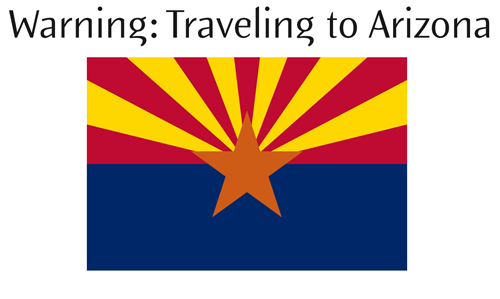


The United States has 49 states and Arizona. The northern part of the state is well known for its intolerance toward immigrants and crazy laws in general. In particular, there is a law that requires law enforcement officers (cops) to make a reasonable attempt to determine the immigration status of a person stopped, detained, or arrested if there's a reasonable suspicion that person is in the country illegally (SB 1070, this provision just ruled constitutional by the US Supreme Court). In Arizona, "reasonable" means anything the police want it to mean, and a "reasonable suspicion" means just about anything. Failing to produce proof of being a legitimate visitor from outside the US or of being a citizen of the US can land you in a detention center awaiting judgment and deportation. (Laws on guns ownership, possession, and concealment of guns in public are also scary, but not the topic here.) Fortunately, Tucson is in the southern part of the state and thus not quite so nuts, but Arizona is very pretty and you should see some of it; and you might be traveling through Phoenix, which is at the center of the insanity.
Regardless of your nationality or where you live, when you are in Arizona you might be required at any time to prove who you are and that you are not illegally in the US. You might think that such matters are not Arizona's responsibility. Wrong. You might think that being a US citizen living in the US would make such proof easy and automatic. Not in Arizona. Here are my tips for travelers to Arizona.
Always carry your passport (and visa if you have one). It would not hurt to have your airplane ticket with you as well. Being able to prove that you are not a citizen and only visiting the country will make your stay much safer. That is, it is important to be able to prove you have definite plans to leave—and to have that proof with you at all times.
Carry proof of the legitimacy of your stay in the US, such as one of the following:
You need to carry proof of citizenship with you at all times. An ordinary driver license is generally not sufficient. Here are things that should work.
A US passport, even if expired, is ok. A limited passport issued for fewer than five years is not sufficient. If you are from Puerto Rico, the safe thing is to bring a current passport.
This card is used for travel to and from Canada and Mexico via land and sea ports, but it is sufficient proof of citizenship.
This term is used by Homeland Security to refer to a driver license issued by a state that requires proof of citizenship to issue the license. I believe there are currently only four states that issue enhanced driver licenses:
Driver licenses from other states will not be sufficient.
These are issued to naturalized citizens. If this includes you, you know what it is. It is not sufficient for your parents to have such a certificate; you need your own proof—for example, a Certificate of Citizenship.
These are issued by USCIS to people who derive their citizenship from their naturalized parents.
This proves birth in one of the 50 states, DC, American Samoa, Swain's Island, Puerto Rico, US Virgin Islands, Northern Mariana Islands, or Guam. Carrying this plus a driver license should be sufficient.
This is issued by the US Department of State to US citizens born abroad.
Welcome to Arizona.